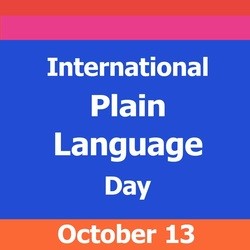As the 20th anniversary conference of the Plain Language Association InterNational, PLAIN2013, drew to a close in Vancouver, International Plain Language Day was celebrated with a free public event on October 13. This marked a perfect opportunity to reflect on the international movement to adopt plain language.
So, what exactly is plain language? It is NOT about writing dull prose in an over-simplified style. Rather, it IS about writing clear documents that are understood the FIRST TIME your target audience reads them. A great definition for plain language is provided by a US network of government employees, who are striving to improve communications to the public:
“Plain language (also called Plain English) is communication your audience can understand the first time they read or hear it.”
Of course plain language can apply to any language, not just English, and its principles remain the same. Readers will find that documents written in plain language will be more relevant and easier to follow and use.
If you are curious about the Canadian context for plain language, The Communications Policy of the Government of Canada has an actual policy requirement specific to plain language, part of which states:
“An institution’s duty to inform the public includes the obligation to communicate effectively. Information about policies, programs, services and initiatives must be clear, relevant, objective, easy to understand and useful.”
As a great example, this summer, Health Canada launched a Plain Language Labelling Initiative to improve the safe use of drugs by making labels and safety information easier to read and understand. This proposal has got to be a good thing: reducing preventable harm and possibly saving lives by using plain language.
Here are a few more plain language writing resources to check out:
The movement for plain language began 20 years ago. While it takes time to see real change, and some sectors will be slower than others to evolve, it’s often employees within organizations who are leading the way. It’s refreshing to see that as certain Canadian municipalities make the news with politicians’ calls to reduce jargon, this sparks greater public discussion about plain language. And as public awareness grows, there is much to celebrate on International Plain Language Day.


Sounds like it was a great event. Thanks for the report!